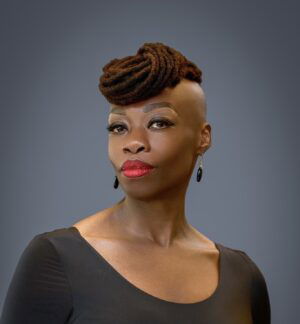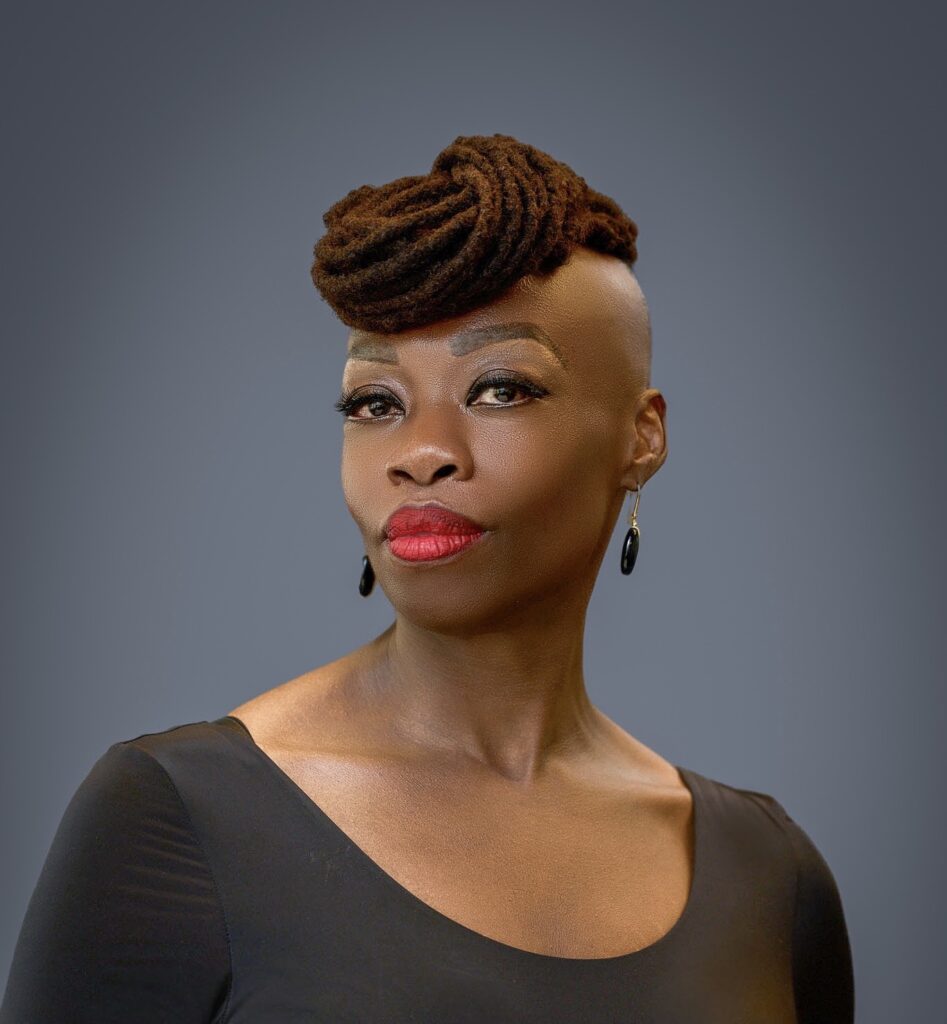
September 20, 2024
The Voices Of Haitian People Must Be Loud, Proud, And Fearless
This Haitian-American author vows to set aside her fear and use her voice and privilege
Written by Francesca Momplaisir
It always strikes me when I’m at a loss for words as a writer. It only happens when I’m afraid, and over the past weeks, I’ve found myself, my tongue, paralyzed with fear once again as Haitian people, my people, are being vilified and victimized.
We are under attack by a former president and right-wing Republicans – racist and xenophobic extremists – spewing hate, perpetuating lies, and issuing threats of violence against Haitian immigrants in Ohio whom they’ve accused of abducting and eating cats and dogs. My fear reached its height when I saw the KKK flyer commanding immigrants to go back to where we came from. The KKK? In broad daylight, in public, on social media?
We have reason to be afraid. However, the silence of my people on the ground in Springfield who have been enduring bomb threats has been deafening.
Why aren’t they speaking up? Even as I took to social media to finally speak my sadness and fear, I was reminded of my experience as an immigrant child coming to the US from Haiti, quickly learning English to translate our native Haitian Kreyol. Haitian migrants in Springfield aren’t choosing to remain silent as dangerous accusations and death threats are hurled at them. More likely, they are like my parents, who didn’t have the language to articulate their fear. Who are the translators on the ground in Springfield? I ponder. And then, I questioned whether my people would speak up and speak out even if they could speak English. Coming from a country where historically voicing anger and discontentment against a corrupt government and presently vocally challenging the violent gangs gets you killed. I don’t know if they would speak if they could scream, “Enough!”
I am desperate to hear from them. Not from Haitians like me who either immigrated long ago or the ones born here, and are therefore both fluent in English and have adopted the history of civil rights-seeking Black people in America. But clearly, the Klan still hasn’t been conquered. How can, why would the Haitians in Springfield say anything? The Klan is coming for us – still, again. And I am afraid.
Suffering in silence, I think back to my childhood when I had words and had to find the words. I came to the US from Haiti as a toddler. I was learning to speak, so I knew my native Haitian Kreyol and English simultaneously. In just a couple of years, as a little girl, I would serve as a translator for my family in matters related to staying in this country. I can remember standing in the darkness of pre-dawn, shivering in the January cold with my mother and sister, waiting for the immigration office to open as if they were the gates to heaven itself. The three of us needed to get our green cards renewed.
This was before INS became USCIS as part of the Department of Homeland Security. Although we’d arrived at 5:00 am, we were not the first in line, far from it. We were in the middle of the wrap-around line that made laps around the block. We waited for hours only to suffer the disgust and condescension of workers who didn’t want to be there and who made it clear that they didn’t want us there. But we were the good ones who worked hard and paid taxes from coins scrounged from the diapers of American infants and elderly alike. Yet we were grateful to be on the inside and outside of humanity’s borders.
At six and nine years old, my sister and I would translate the words but not the disdain of immigration clerks who handled our documents with fingertips and all but threw them back in our faces. If they could have, they could have worn latex gloves to keep the AIDS away. That’s what they thought as they lorded the threat of deportation over our heads.
My mother could read the fury on their faces and in their gestures, which said, “Get out of my face, out of my country, far far away from me, from here.”
But we were lucky ones who’d come here legally. Unlike my aunt, who’d arrived on a slow speedboat in the eighties into the hands of abusive Coast Guard agents. Unlike my cousin in 2021, who walked over corpses in her path as she crossed the Darien Gap only to be chased and caught by ICE agents whom we’d seen on the news on horseback with ropes that looked like whips, echoing a brutal history of capturing runaway slaves. But even my aunt and my cousin had been lucky. My aunt had arrived before Haitians fleeing a dictatorship and poverty were being sent to Guantanamo Bay – the nonrefuge for Haitian refugees who were mislabeled as HIV/AIDS transmitters. My cousin was fortunate to have spent only days in a US-Mexican border detention center before being “rescued” by a Christian group that took them to California. My aunt and cousin had been released to waiting family members who’d established themselves legally and fruitfully in the US years ago. My sister and I would translate for them, too. But only when they needed to say something that would allow them to remain in this country. Otherwise, they mostly stayed silent, as if any recounting of their tragic journeys would result in reprisal or get them sent back to the poverty and danger from which they’d fled. They only spoke to relatives about their land and sea crossings in hushed tones.
They dared not even dream of having the privilege to analyze their situation in the context of US politics and policy. Nor did they risk discussing Haiti’s history of abuse and disenfranchisement by its French and other Western world colonizers and US-installed presidents. Even through a translator, they wouldn’t talk about the punishment that has been levied against them for the audacity to liberate themselves from the shackles of their slavers. They say little to nothing about the reparations demanded by France that left Haiti economically crippled.
They are too fearful and traumatized to speak of the events of the past hundred years – US occupations, murderous dictators, detention in GITMO, a place reserved for terrorists before they could ever make it to the shores or borders of “the land of the free.” Ahhh…That’s it: they/we are constantly reminded that our freedom is conditional. Keeping it requires self-censorship. Hush, hush, hush. Or go back to where you came from. Or be deported to your inhabitable homeland made so by colonial theft of wealth and more than a century of punitive US policies.
I imagine that the Haitian migrants in Springfield are experiencing the same fear of speaking out against their plight, especially after former President Donald Trump said in public! On national television! During the presidential debate! They are feasting on the pets of the rightful residents who have been burdened by the transplantation of immigrants in their city.
My people on the ground require that someone “pretenou lang” “lend us your tongue or language,” as my grandmother would say. But as in centuries past, they are likely less concerned about speaking and more about survival. The KKK is kkkoming for them, for us. The former president has blown the dog whistle. ICE is coming. Haitian children might be attacked or blown to bits by threatened bombings. And we have to work, to eat, to be housed. To stay alive.
Never mind words. Never mind language. Never mind speech. Never mind explaining what’s happening, “the situation on the ground,” being discussed by local and national politicians and media. Never mind what privileged first, second, and third-generation Haitian-Americans are saying on their (own) behalf. And never mind the resilience for which the oppressed are forever being touted. Just because we’re strong and can and have proudly withstood battery and survived disenfranchisement doesn’t mean we don’t hurt. My people in Ohio live the fear perpetuating the paralysis that feeds the loud silence. They are trying to survive it. But at least they’re alive, at least for now.
In the meantime, I will set aside my own fear, paralysis, and wordlessness, leverage my privilege and lend them my tongue. But words are not protection.

Francesca Momplaisir is the author of The Garden of Broken Things and My Mother’s House. Born in Haiti, she is a multi-lingual scholar and novelist writing in English and Kreyol. Dr. Momplaisir studied at Columbia University, the University of Oxford, and New York University, where she earned a doctorate in African and African diaspora literature. She is the recipient of a Fulbright fellowship to travel to Ghana to research the cultural retention of the transatlantic slave trade. Her debut novel was compared to Toni Morrison’s At the Height of Her Career” (Harper’s Bazaar) and made several best book lists, including Elle and Vulture.